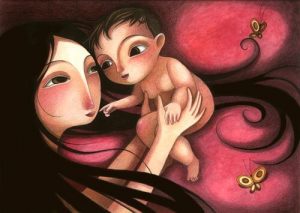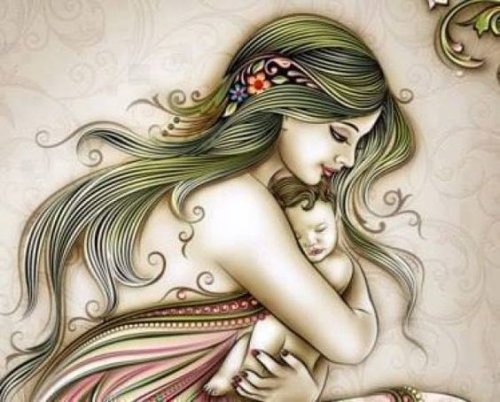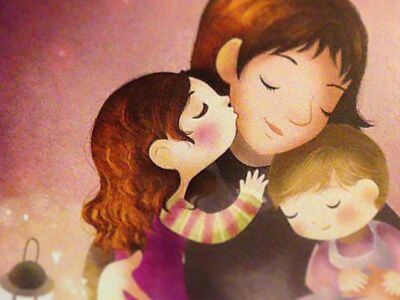I Only Know That I Love You, Son

Son, from the very moment I knew I had life inside of me… I knew that I love you.
We know that maternal love can reach many aspects in the human being and that it is also a crucial element for our development.
In the extended version of the book entitled “Maternal Love” (2016), Sue Gerhardt, a British psychotherapist, explores this aspect in depth through the relationship between the brain and human emotions.
Dr. Gerhardt confesses that the pace of modern life has led her to reflect on love and its nature in different areas, always from an empirical approach. This is why she has already published several books in which she has devoted herself to analyzing the cerebral aspects of love.
Gerhardt is considered the greatest expert in the world in her field.
Gerhardt believes that the way in which we do or do not show our love for our babies leads to a series of biochemical changes in the baby’s brain. She states that a baby’s brain between the ages of 0-2 years is highly susceptible to influences, especially those that are translated as lived experiences with their caregivers.
The importance of the first “I love you”
In other words, Dr. Gerhardt says love is able to make such an impression on babies in early childhood that their mental health will largely depend on it.
That is, if a baby is cared for and loved, he will be able to develop good mental health later on. If affection and care are not given importance during early childhood, the baby will not be able to tolerate the stress of feeling vulnerable.

Remember that a baby cannot stand on its own. A baby needs a person to care for him and love him, whether it is a mother, father, family members or other caregivers.
Other mammalian offspring in the animal kingdom manage to stand up, walk and even run within a few hours of being born. A human being cannot fend for himself at all in his early childhood. His development goes at a much more gradual pace.
In Maternal Love, the doctor also explains the importance of being present for your baby, making him feel safe. According to her research, in the post-natal stage babies need help to tolerate stress in every aspect.
The act of leaving the womb is a change so abrupt for babies that they constantly need the love of their mother and physical attachment to her to be able to overcome this first great stress.
The interaction we establish with our babies from the moment they are born leaves a significant imprint on them. Hence the importance of leaving this mark in a positive way, since it lasts a long time and constitutes a transcendental experience.
Here’s a letter that illustrates what maternal love is capable of during early childhood. You will see that your baby also feeds on the love you give him and that the more you give him your attention and affection, the better he will feel in the world and, above all, with you.
I love you more than anything

Son, I love you more than anything in life. Even before you were born, I loved you. With the magical spark of that first moment in which I heard I was going to be a mother, giver of life, my heart displayed all its affective capacity. Since then I have not held back any of this great love, and I give it to you in everything I do and everything I am.
When I look at you, I realize that since I have had you with me, my life is much better. You, my love, are the reason why I wake up every day, why I face this increasingly aggressive world, full of problems and new demands.
For you, I surpass everything. Because I love you and, above all, I want you to be happy. Often, I think that my love for you will give me the strength to overcome all obstacles and be a better person.
My love for you is the most powerful feeling I have, and you do not have to tell me anything for me to remember my duties to you. I love you just for the fact that you are the fruit of life I was able to conceive. My baby.
I know that I am capable of loving you as I do, because I know that I too was also loved for merely existing. Now that you are a baby, you ask me to be with you constantly because your more basic, instinctive needs indicate this is the best way to survive. You and I know that we are social beings and that love shapes our lives. In love, we become stronger.
With time, as I did, you can love as much as I can. I will be there to see that you can achieve it. By my side, you will learn that beyond survival, there is something very beautiful, sweet and vast called love.
The truth is that I only know that I love you, and that is enough for me.
All cited sources were thoroughly reviewed by our team to ensure their quality, reliability, currency, and validity. The bibliography of this article was considered reliable and of academic or scientific accuracy.
- Bowlby, J. (1986). Vínculos afectivos: formación, desarrollo y pérdida. Madrid: Morata.
- Bowlby, J. (1995). Teoría del apego. Lebovici, Weil-HalpernF.
- Garrido-Rojas, L. (2006). Apego, emoción y regulación emocional. Implicaciones para la salud. Revista latinoamericana de psicología, 38(3), 493-507. https://www.redalyc.org/pdf/805/80538304.pdf
- Marrone, M., Diamond, N., Juri, L., & Bleichmar, H. (2001). La teoría del apego: un enfoque actual. Madrid: Psimática.
- Moneta, M. (2003). El Apego. Aspectos clínicos y psicobiológicos de la díada madre-hijo. Santiago: Cuatro Vientos.
This text is provided for informational purposes only and does not replace consultation with a professional. If in doubt, consult your specialist.








